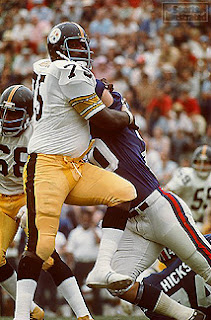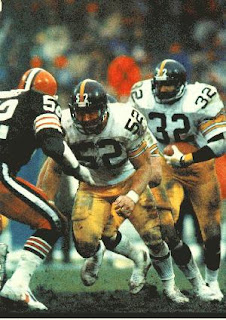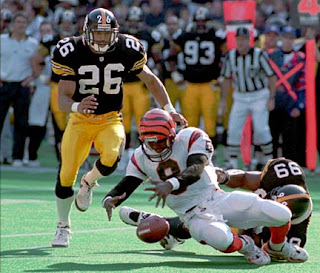 New Steelers coach Mike Tomlin is just the team's third boss in 38 years. The 35-year-old inherits a team that followed up its win in Super Bowl XL with an 8-8 campaign that did not include a playoff trip. Says receiver Hines Ward of adjusting to the new coach, "It's a feeling-out process."
New Steelers coach Mike Tomlin is just the team's third boss in 38 years. The 35-year-old inherits a team that followed up its win in Super Bowl XL with an 8-8 campaign that did not include a playoff trip. Says receiver Hines Ward of adjusting to the new coach, "It's a feeling-out process."By
Jarrett Bell, USA TODAY
June 17, 2007
PITTSBURGH — One by one they straggled off the field, sweaty and seemingly sapped as much by the intense practice session as by they were by the muggy, 85-degree heat.
It was just a "voluntary" OTA (uh, organized team activity) in mid- May without full pads.
Yet with the fast tempo and heavy dose of 11-on-11 team drills, in many ways for the Pittsburgh Steelers this has the feel of a two-a-day training camp outing in July or August.
"I've been watching minicamps and stuff on the NFL Network," linebacker
Larry Foote said, wiping perspiration from his forehead. "The teams I've been watching, they don't go as hard as we go. We've been flying around. They sure got the right man to replace (Bill) Cowher. He's just as competitive.
"And I swear he's maxing out on the time. By rule, he's using all that he can."
A short time later in the cafeteria, new Steelers coach Mike Tomlin flashed a sly grin as he picked through his vegetable lasagna.
According to the collective bargaining agreement, new coaches can conduct two additional minicamps on top of the standard mandatory offseason minicamp. All coaches can also stage 14 voluntary OTAs, which can last no longer than two hours.
"We only used about 1:48 today," Tomlin said. "See, I'm a nice guy."
Maybe it was the intensity that made it seem longer for the players. Cowher surely worked the Steelers hard and had physical training camps. But this time of year, in the OTAs, he kept the tempo in a low gear and rarely had 11-on-11 drills.
Said Tomlin: "Ah, they'll get used it."
The winds of change surely are blowing through the Steelers' headquarters on the South Side as Tomlin, confident and collected, becomes just the team's third head coach in 38 years. Cowher, who stepped down in January after 15 seasons, was the only head coach many of the returning players ever knew.
Cowher was continuity. Tomlin represents conversion.
"You've done it one way for so many years," says veteran receiver
Hines Ward. "There's just a sense of uncertainty. It's different. That's not good or bad. It's a feeling-out process."
Ward, an established locker-room leader, feels he has developed some rapport with the new coach. Tomlin impresses him as a straight shooter who won't sugarcoat his message. Yet change isn't always easy, which is why Ward's emotions this offseason have been so unlike the past.
"I was a little upset," Ward said of the transition, which has also seen the release of longtime linebacker
Joey Porter amid a contract dispute and a simmering spat with perennial All-Pro guard
Alan Faneca over his deal.
"In some ways," he added, "I feel like the Last Mohican."
Faneca showed up at a mandatory minicamp in May, but has skipped the voluntary sessions and vowed that this will be his last year in Pittsburgh.
"Sure, it's an issue," Tomlin told reporters during the minicamp. "But more than anything else, it's got to be a lesson for us as a football team in that the season is not without its ups and downs. Adversity is part of it; distractions are part of it."
Tomlin's handling of the Faneca flap might have provided a clue of how prepared he is for the nuances of the new job, despite his limited experience.
A day after Faneca publicly blasted the front office, he refused to participate in a morning practice. Tomlin talked with Faneca during the lunch break and convinced him to hit the field for the afternoon session. In speaking to reporters about the situation, he was delicate, saying how he at least understood Faneca's emotions.
Faneca is due to earn $4.375 million this year in salary and bonuses, but saw guards without a single Pro Bowl appearance on their resumes sign whopping free-agent contracts this offseason with more than $17 million guaranteed.
"I view this business like all businesses, as a people business," Tomlin, 35, said over lunch. "You've got to be able to interact, relate and communicate. You've got to understand to a degree, where people are coming from."
Players are already finding out about the substance and style behind Tomlin's meteoric rise through the coaching ranks. In film sessions, for instance, he points out mistakes or uninspired play before the entire team during what he terms "The News." He spares no one.
Ward and quarterback
Ben Roethlisberger have already been subjects on "The News" for practice-field issues.
"The way he sees it, if you end up in that, just take it as constructive criticism," says Ward. "Some guys like it, some guys don't like it. It is what it is. The main thing is, we can't fall into the type of thinking, 'This is how we used to do it.'."
 Ben Roethlisberger must bounce back from the disappointment of 2006 with a new coaching regime, including new offensive coordinator Bruce Arians.
Ben Roethlisberger must bounce back from the disappointment of 2006 with a new coaching regime, including new offensive coordinator Bruce Arians.
Tomlin, whose teaching abilities convinced Tony Dungy to hire him for his first pro job as a secondary coach for the Tampa Bay Buccaneers, coached just six years as an NFL assistant. He was a defensive coordinator for just one year, with the Minnesota Vikings in 2006.
But as was the case with Cowher and, before him, Chuck Noll, Steelers owner Dan Rooney and his son, Art II, the team president, think they have caught a rising star at the right time.
Still, despite the history, Tomlin's hire was shocking because he was chosen over two prominent Cowher assistants that were candidates — former offensive coordinator Ken Whisenhunt and former offensive line coach Russ Grimm.
Whisenhunt became the Arizona Cardinals' coach and hired Grimm after the Steelers chose Tomlin.
"Every job I've gotten," Tomlin says, "I've kind of been the surprise selection."
He hardly sounds fazed. Tomlin played receiver at William & and Mary but thinks that growing up in Newport News, Va., — where his mother Julia worked in the shipyard and his stepfather, Leslie Copeland, worked the overnight shift at the post office — hardened him for the intense scrutiny that undoubtedly will come with his new job.
Go ahead, ask Tomlin if the Steelers' defense is still its traditional a 3-4 scheme (veteran coordinator Dick LeBeau remains on staff) or a 4-3 alignment featuring the Cover 2 philosophy Tomlin has employed so successfully in the past.
"I ain't answering that question," he shoots back. "You'll see on September 9th when we go to Cleveland. We're going to keep 'em guessing."
Then Tomlin breaks into a broad grin. Even with the 3-4 as the base defense, he explains how LeBeau used four linemen on about 40% of the snaps last season and that Cover 2 teams typically only play the scheme 33% of the time.
"People want to use a catch phrase and put you in a box," he says. "The reality is always more complex than that. The lines are gray."
Tomlin's mention of the Sept. 9 opener raises another issue. On that day, he figures, maybe he'll have that defining "I'm-a-head-coach" moment.
What to do on fourth-and-one?
"Go for it," he says. "That might be the moment."
To this point, even though he's in charge, it feels much like the other jobs. Long hours with lots of videotape study and strategizing X's and O's.
Surely Tomlin knows something is different when he ventures out in public. Steelers-crazed fans make him aware of his new responsibility at every turn. Yet at the first minicamp, there was no need for any big speech to lay out the theme or team objectives.
"There will be a time for that," Tomlin says, "when we get to training camp."
For a squad that followed its Super Bowl XL victory with an 8-8 finish last season, Tomlin won't have to say much about team goals. Noll won four Super Bowls with the Steelers. Cowher went to the playoffs 10 times, advanced to six AFC title games and went to two Super Bowls.
Each day, Tomlin passes a shrine near his second-floor office that displays the franchise's five Lombardi Trophies.
"It was going to be tough for whatever coach came in here," says Ward. "It was tough for Bill when he followed Chuck Noll. Expectations are high around here. We expect to be in the playoffs and compete for the Super Bowl every year.
"If you don't expect to win, then why are you playing?"
AROUND THE FIELD IN PITTSBURGH
Quarterback: With a new coordinator in Bruce Arians and a new playbook,
Ben Roethlisberger might be the player most affected by the offseason upheaval. He should enjoy the simpler terminology and will control line blocking adjustments, a subtle task intended to reduce mix-ups. He started his offseason program early, a good follow-up after an NFL-high 23 interceptions in 2006.
Charlie Batch returns as the backup.
Running back: When Tomlin studied videotape of
Willie Parker, he discovered a much better runner between the tackles than he previously thought. Still, there are no visions of wearing Parker down like a plow horse. Tomlin wants a 1-2 punch, which is why
Kevan Barlow was signed to compete with
Najeh Davenport for the supplemental work.
Wide receiver:
Hines Ward struggled with a tender hamstring last season and missed two games after getting a knee scoped. He still caught 74 passes. Tomlin has also been impressed with the grittiness and big-play potential of last year's No. 1 pick,
Santonio Holmes.
Tight end: Arians wants to create mismatches in the passing game and believes three-tight-end sets — and potential to split
Heath Miller from such schemes — can be a means to that end.
Offensive line: Left guard
Alan Faneca is unhappy about his contract after earning six Pro Bowl trips. But the Steelers expect Faneca will be a pro between the lines.
Sean Mahan,
Kendall Simmons,
Chris Kemoeatu,
Willie Colon and
Max Starks could be fighting for jobs on the right side.
Defensive line: Officially, the Steelers still employ a 3-4 defense. But with the Cover 2-schooled Tomlin and coordinator guru Dick LeBeau putting their heads together, on-the-fly adaptation will be in effect. Pittsburgh will line up in 3-4 and 4-3 looks, depending on the situation. The player to really watch will be right end
Brett Keisel, who led the team with 23 pressures in 2006. Keisel is versatile enough to play end or linebacker and flip the switch on a dime. Also, second-round pick
LaMarr Woodley looks like an athletic type with the potential to do likewise.
Linebacker:
Joey Porter's gone, which means the Steelers lost a fiery competitor, locker room favorite and top-notch edge rusher.
Lawrence Timmons was drafted as his eventual successor. Leading tackler
James Farrior and
Larry Foote man the inside, and underrated
Clark Haggans flies from the left corner.
Secondary: Big passing plays dogged the defense last season, reflective of the risk that comes with heavy blitzing. The starters return, led by all-pro safety
Troy Polamalu. Tomlin, whose first NFL job was coaching defensive backs with the Tampa Bay Buccaneers, has spent much time with his new secondary. It will be interesting to see how he meshes Cover 2 techniques — built on the principle of not allowing big plays — into the coverage.
Special teams: The Steelers drafted athletic punter
Daniel Sepulveda, which led to the release of 16-year vet
Chris Gardocki. With Gardocki gone, reliable kicker
Jeff Reed will get a new holder — a job easily overlooked until games are on the line.
Coaching staff: Despite major defections to the Arizona Cardinals, Tomlin kept much of Bill Cowher's staff intact, including LeBeau. Arians was promoted from receivers coach and longs to make a mark after being unable to finish what he started in his previous chance at coordinating with the Cleveland Browns.
Outlook: For Tomlin, whatever pressure is attached to a job that is steeped in tradition is balanced by the thought this is no downtrodden program. It's been less than 18 months since the Steelers won Super Bowl XL. The culture of winning and expectation of competing are firmly entrenched, and there's enough talent in tow to allow the Steelers to remain a factor in the battle for the AFC North and make another push for the playoffs.































